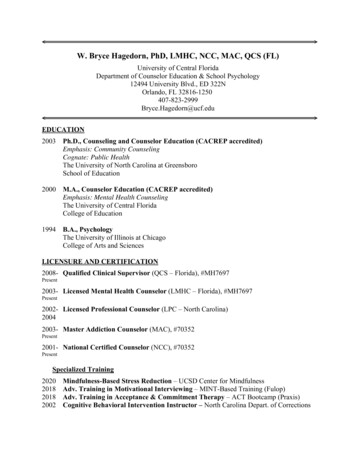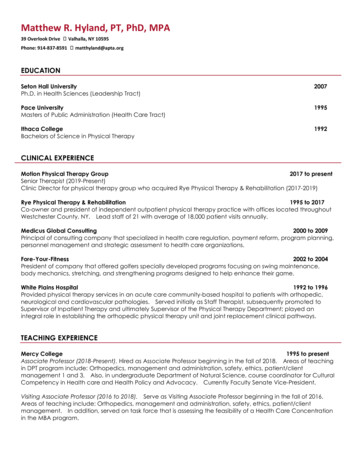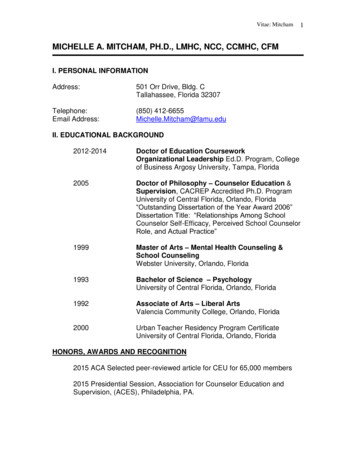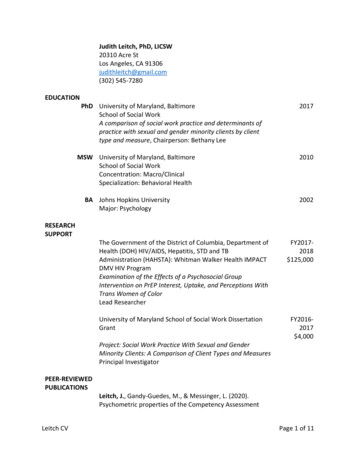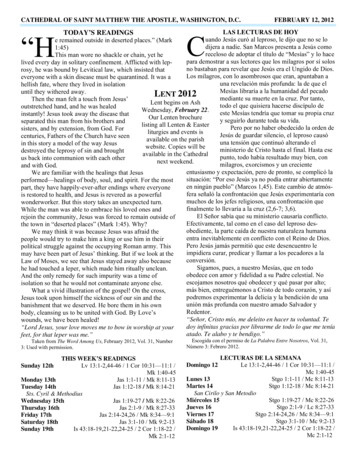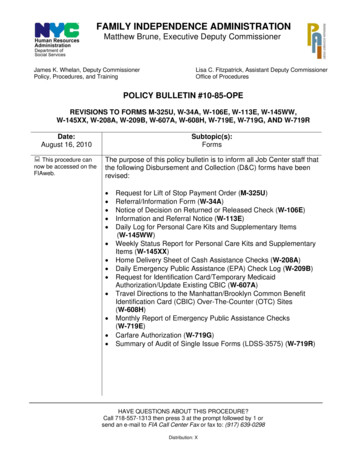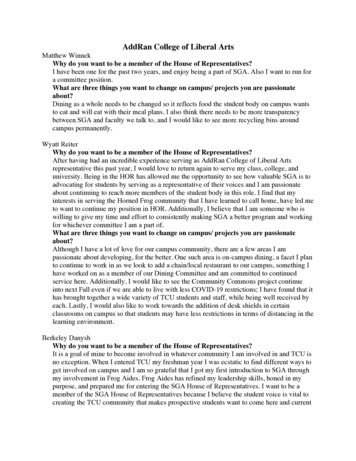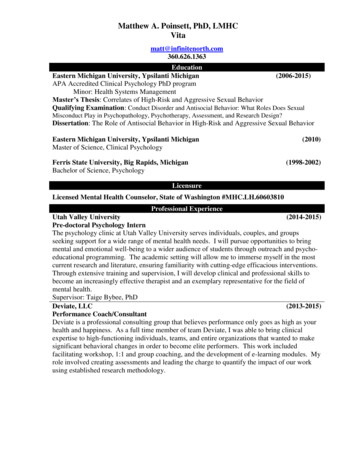
Transcription
Matthew A. Poinsett, PhD, nEastern Michigan University, Ypsilanti Michigan(2006-2015)APA Accredited Clinical Psychology PhD programMinor: Health Systems ManagementMaster’s Thesis: Correlates of High-Risk and Aggressive Sexual BehaviorQualifying Examination: Conduct Disorder and Antisocial Behavior: What Roles Does SexualMisconduct Play in Psychopathology, Psychotherapy, Assessment, and Research Design?Dissertation: The Role of Antisocial Behavior in High-Risk and Aggressive Sexual BehaviorEastern Michigan University, Ypsilanti MichiganMaster of Science, Clinical PsychologyFerris State University, Big Rapids, MichiganBachelor of Science, Psychology(2010)(1998-2002)LicensureLicensed Mental Health Counselor, State of Washington #MHC.LH.60603810Professional ExperienceUtah Valley University(2014-2015)Pre-doctoral Psychology InternThe psychology clinic at Utah Valley University serves individuals, couples, and groupsseeking support for a wide range of mental health needs. I will pursue opportunities to bringmental and emotional well-being to a wider audience of students through outreach and psychoeducational programming. The academic setting will allow me to immerse myself in the mostcurrent research and literature, ensuring familiarity with cutting-edge efficacious interventions.Through extensive training and supervision, I will develop clinical and professional skills tobecome an increasingly effective therapist and an exemplary representative for the field ofmental health.Supervisor: Taige Bybee, PhDDeviate, LLC(2013-2015)Performance Coach/ConsultantDeviate is a professional consulting group that believes performance only goes as high as yourhealth and happiness. As a full time member of team Deviate, I was able to bring clinicalexpertise to high-functioning individuals, teams, and entire organizations that wanted to makesignificant behavioral changes in order to become elite performers. This work includedfacilitating workshop, 1:1 and group coaching, and the development of e-learning modules. Myrole involved creating assessments and leading the charge to quantify the impact of our workusing established research methodology.
Matthew A. Poinsett, PhD, LMHCVitaThe Center for Counseling and Health Resources(2011-2013)Mental Health CounselorThe Center specializes in whole person care for individuals suffering from severe mental healthand substance abuse pathology. Collaborating with a team of physicians, dieticians, chemicaldependency specialists, and other mental health professionals, I provide individual and grouptherapy to clients with comorbid disorders in a partial hospitalization setting focusing onimproving client functioning. Additional job responsibilities include intake assessment, mentalhealth evaluations, utilization reviews for insurance authorization, and assisting with thedevelopment and analysis of outcome research.Supervisor: Shelley Miller, MA, LMFT, MHPMcLaren Behavioral Health(2009-2010)Student TherapistMcLaren’s Oakbridge Center provides treatment through a partial hospitalization program aswell as ongoing outpatient therapy. The team-oriented approach combined input from socialworkers, psychologists, a recreational therapist, psychiatrist, and mental health nurses. Paralleltracks of adolescents and adults were provided care through the PHP. While in the program,patients developed daily goals, attended therapy groups and psychoeducation groups, met with apsychiatrist, participated in recreational therapy and were engaged in a therapeutic milieu.Supervisor: Dr. Gary Cotter, Ph.D., LPDr. Rosenbaum & Associates(2008- 2009)Psychometrician/Student TherapistRosenbaum and Associates provided psychological evaluations for government programsincluding social security disability applications and assessments for job placement throughMichigan Rehabilitation services. Batteries consisted of intelligence tests (WAIS-III, WAISIV), achievement tests (WRAT-4), personality inventories (MMPI-MINIMULT, MCMI),neurological screening (Bender-Gestalt), as well as other behavioral indicators (BDI). Inaddition to testing and writing reports, I provided individual therapy to several clients.Supervisor: Dr. Thomas Rosenbaum, Ph.D., LPEastern Michigan University Psychology Clinic(2007-2010)Student TherapistThe EMU psychology clinic offers a sliding scale fee for college students and communitymembers (child and adult) with a diverse range of psychological problems requiring short-termand long-term care. With a variety of clinical supervisors, I have practiced a wide range oftherapeutic techniques. Specifically, I have had supervised practice with cognitiverestructuring, problem solving skills training, assertiveness training, Dialectical BehavioralTherapy, Acceptance and Commitment Therapy, as well as a variant of other interventions.Supervisor: Fully Licensed Psychologists, Clinical Psychology FacultyFriends of Youth, Residential Advisor(2004–2005)As a full-time employee, my duties included supervising and implement treatment plans for 10to 12 juvenile sexual offenders enrolled in the residential treatment facility. The juveniles werebetween 13 and 18 years old, presenting with sexual behavior problems as well as depression,anxiety, ADHD, and other comorbid conditions.Supervisor: Dr. Carol Almero, LP
Matthew A. Poinsett, PhD, LMHCVitaAspen Achievement Academy, Field Instructor(2003–2004)In this therapeutic wilderness program, I led experiential interventions and group therapyaddressing at-risk youth. The outdoor setting, revolving admissions policy, and 24-hour-perday engagement offered unique therapeutic opportunities. Primary diagnosis of the populationincluded substance abuse, depression, ADHD, Oppositional Defiant Disorder, and ConductDisorder.Supervisors: Various Master’s and PhD level cliniciansCurriculum DevelopmentIn collaboration with an expert in pedagogy, the following comprehensive treatmentprotocols were developed for use in a partial hospitalization setting with rollingadmissions and interchangeable facilitators.Depression Management: Integrating theory and practice from Cognitive Behavioral Thearpyand Acceptance and Commitment Therapy, the Depression Management curriculum providesprotocols for educating clients in a wide variety of emotion regulation strategies includingthought challenging, cognitive restructuring, mindfulness, behavioral activation, casemanagement, relapse prevention, suicide prevention, defusion, acceptance, and values-basedliving. The program provides handouts, discussion prompts, and multimedia tools to maximizeclient engagement.Anxiety Management: Integrating theory and practice from Cognitive Behavioral Thearpyand Acceptance and Commitment Therapy, the Anxiety Management curriculum providesprotocols for educating clients in a wide variety of emotion regulation strategies includingthought challenging, cognitive restructuring, mindfulness, controlled breathing, biofeedback,guided visualization, and systematic desensitization. Various exercises in grounding,progressive muscle relaxation, and mindfulness are provided via CD for group leaders to use insession and for clients to use daily.Becoming Strong Again: Primarily focusing on Acceptance and Commitment Therapy, theBecoming Strong Again curriculum provides tool for client to identify personal values andindividual strengths. Course content focuses on cultivating a positive self-image, eliminatingnegative core beliefs, and increasing focus on internal locus of control.Healing the Scars of Emotional Abuse: Integrating theory and practice from CognitiveBehavioral Thearpy and Acceptance and Commitment Therapy, the Healing the Scars ofEmotional Abuse curriculum provides protocols for processing patterns of interpersonal abuseand strategies for developing increased self-compassion and less distorted self-perceptions.With guided exercises, structure assignments, discussion prompts, and a variety of multimediaresources, this curriculum delivers evidence based concepts in a format easily accessible to awide variety of clientele.Teaching ExperiencePrinciples of Group Therapy(2014-2015)Utah Valley UniversityCo-InstructorWorking closely with a co-instructor, students were engaged in an experiential and a didacticcomponent to this course focused on both the process and the empirical understanding of grouptherapy.
Matthew A. Poinsett, PhD, LMHCVitaInformation Sciences & Technology Leadership Diplomat Academy,(2013)Pennsylvania State UniversityGuest LecturerProvided an overview of the importance of Positive Psychology within business and leadership.Facilitated discussion and various exercises in order to cultivate more positive and productivepatterns of thinking.General Psychology, Mott Community College(2010-2011)Adjunct LecturerCollaborated with co-author of the general psychology textbook (Introduction to Psychology,9th ed., Rod Plotnik & Haig Kouyoumdjian) in an effort to deliver a dynamic and accessiblecurriculum for many first generation and nontraditional college students.Introduction to Psychology, Eastern Michigan University(2009-2010)Adjunct LecturerPlanned and implemented a curriculum aimed and introducing EMU undergraduates topsychological concepts including, scientific method, neurobiology, sensation, perception,motivation, emotion, intelligence, psychopathology, and therapeutic intervention.Developmental Psychology, Baker College(2010)Adjunct LecturerTaught advanced undergraduate students pursuing degrees in Teaching and Human Services. Iused the “Understanding by Design” pedagogy and used multimedia extensively to optimize thelearning experience.Applied Psychology, Baker College(2010)Adjunct LecturerTaught a curriculum providing practical information to nontraditional students pursuing degreesin Teaching and Human Services. I used the “Understanding by Design” pedagogy and usedmultimedia extensively to optimize the learning experience.Community Outreach/TrainingInjured and Happy, Poulsbo Running(2014)Provided skills-training to maintain emotional wellness during times of physical limitations.Stress Management and Relaxation, Kitsap CrossFit(2013)Delivered practical strategies for managing stress and developing relaxation skills, includingcontrolled breathing biofeedback, mindfulness, progressive muscle relaxation, and guidedimagery.Effective Behavior Change, Pennsylvania State University(2013)Addressed barriers of effective behavior change and outlined strategies for initiating difficultpersonal commitments.Staff Alignment Retreat, Pennsylvania State University(2013)Two-day staff training aimed at identifying personal and profession values, developing acomprehensive mission statement, and outlines goals to maximize productivity.Wellness Day, Charyl Stockwell Academy(2009)To promote mental health and debunk myths about psychology, I presented basic psychoeducation to small groups of middle school students during a daylong activity encouraging fullbody wellness.Smoking Cessation Workshop(2008)This workshop was presented free of charge through a local community health clinic. Materialswere created and distributed, providing information on addiction and introducing variousstrategies aimed at smoking cessation.
Matthew A. Poinsett, PhD, LMHCVitaProfessional Activities/MembershipsLoa Fund(2011-Present)Founding Board MemberEngage in organizing, fund-raising, reviewing literature, and collaborating with clinicalprograms with the aim of providing low-income individuals access to appropriate and effectivemental health therapy and substance abuse treatment.Eastern Michigan University Doctoral Training Committee(2008-2009)Student RepresentativeRepresented the student body in faculty led monthly DTC meetings, provided feedbackregarding programmatic changes, clarified expectations, and advocated for the fair treatment ofstudents.Association for Contextual Behavioral SciencesProfessional MemberAmerican Psychological AssociationAssociate MemberResearch ExperienceDoctoral Research Fellow, Eastern Michigan UniversityWorking independently, with faculty, and other students, I was an ongoing contributor to ourresearch efforts. My research focus was primarily on developing a more comprehensiveunderstanding of the development of sexually aggressive behaviors within normativepopulations.Volunteer Research Assistant, University of WashingtonAs a volunteer research assistant, I was contributed to a large-scale research program throughrough screening potential participants for a study examining the relationship betweeninebriation and sexual decision making. During this time, I also collaborated with graduate andundergraduate researchers in developing and initiating new projects.Undergraduate Research Assistant, Ferris State UniversityIn a fledgling psychology program, I worked closely with a small group of faculty and studentsto developing studies based on the Implicit Associations Test. The brand new research programafforded me the opportunity to be involved in every stage of the project development.Papers/PresentationsDaley, D. & Poinsett, M. (2014, August) Cultivating Cultural Positivity. Workshop presentedat that Wilderness Therapy Symposium Annual Conference.Loverich, T. Poinsett, M., & Lambie, I. (2013, October). Sexual Aggression and AntisocialBehavior: Piloting an Integrative Predictive Model. Poster presented at the Associationfor the Treatment of Sexual Offenders Annual Conference.Poinsett, M. & Loverich, T. (2010, March). Correlates of high-risk and aggressive sexualbehavior. Poster session presented at the Eastern Michigan University GraduateResearch Fair, Ypsilanti, MI.
Eastern Michigan University Psychology Clinic (2007-2010) Student Therapist The EMU psychology clinic offers a sliding scale fee for college students and community members (child and adult) with a diverse range of psychological problems requiring short-term and long-term care. With a var
